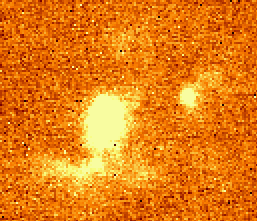Spectra used in this Tutorial
We will be processing data taken after the clearing of monsoon
storms on the morning of 2000 July 16, at the venerable Kitt Peak 2.1-meter
telescope. The data
is of a heavily-embedded young stellar object S140 IRS 1 in the L1204
molecular cloud (Cepheus). It is a 7th magnitude source at the 2.34
micron (4272 cm-1) wavelength of the first overtone band of
the CO molecule (low J). Owing to the high degree of obscuration, we
expect to see the signature of interstellar CO absorption lines along
this line of sight. We are using the spectrum of Deneb (which was at
a similar elevation at the time of observations) as a comparison
spectrum to remove atmospheric features. The data are composed of
eight 600-second exposures, with "seat of pants" guiding as this source is
optically invisible. Slit losses due to inaccurate guiding are
estimated to be 20-30%; pretty good considering!
Note that these data were taken with the "old" Aladdin I array, and
with multiple-sampling (i.e. 4 Low Noise Reads), about 5% of the array's
pixels are bad and must be discarded. This dataset therefore represents an
instructive challenge, as improper rejection of bad pixels
will yield useless results.

Image of S140 IRS 1 at 2.34
microns, taken with Phoenix in imaging mode during target acquisition.
Last modified: Sat Jul 21 01:43:14 MST 2001


 Back: Introduction
Back: Introduction  Next: Installing and
Preparing IRAF
Next: Installing and
Preparing IRAF